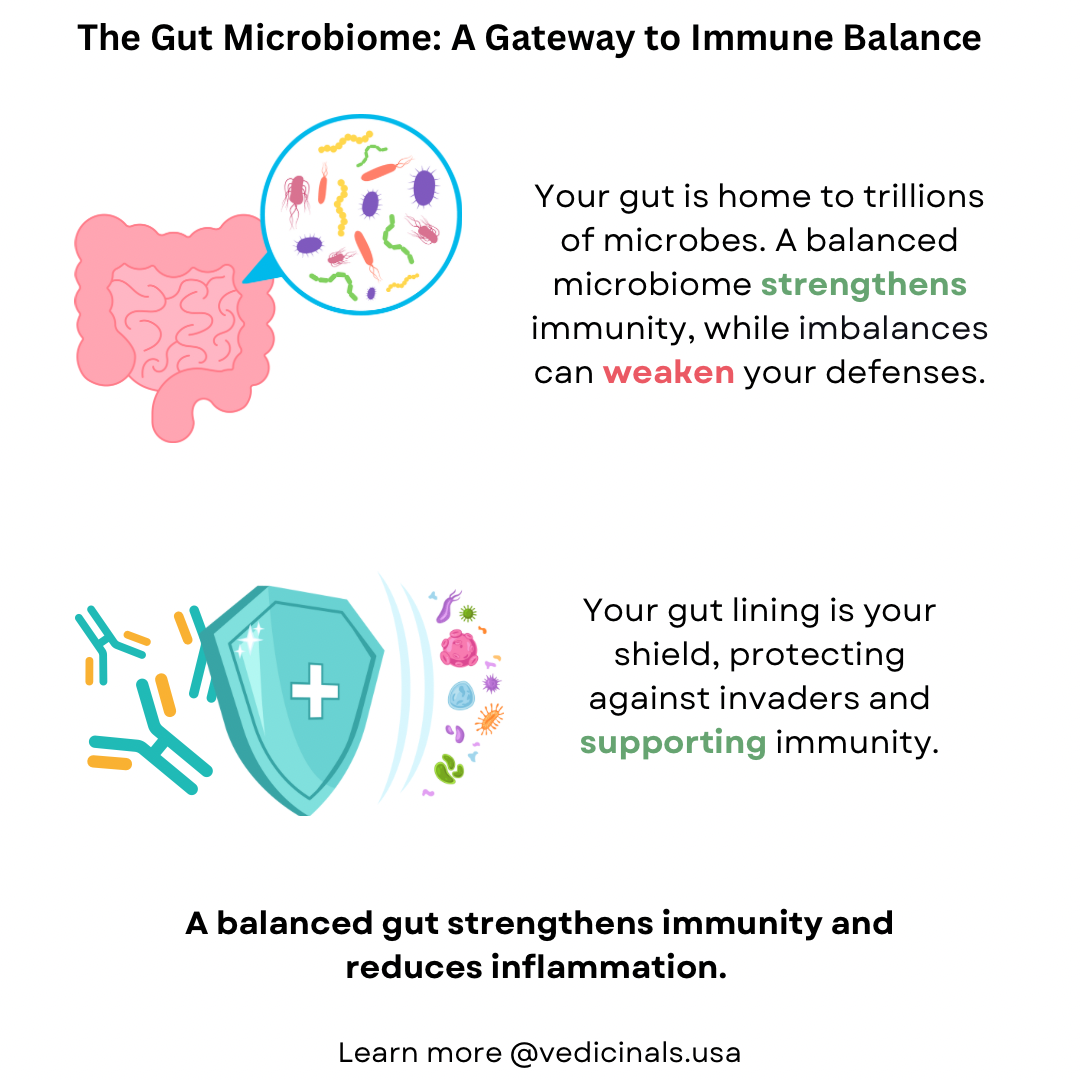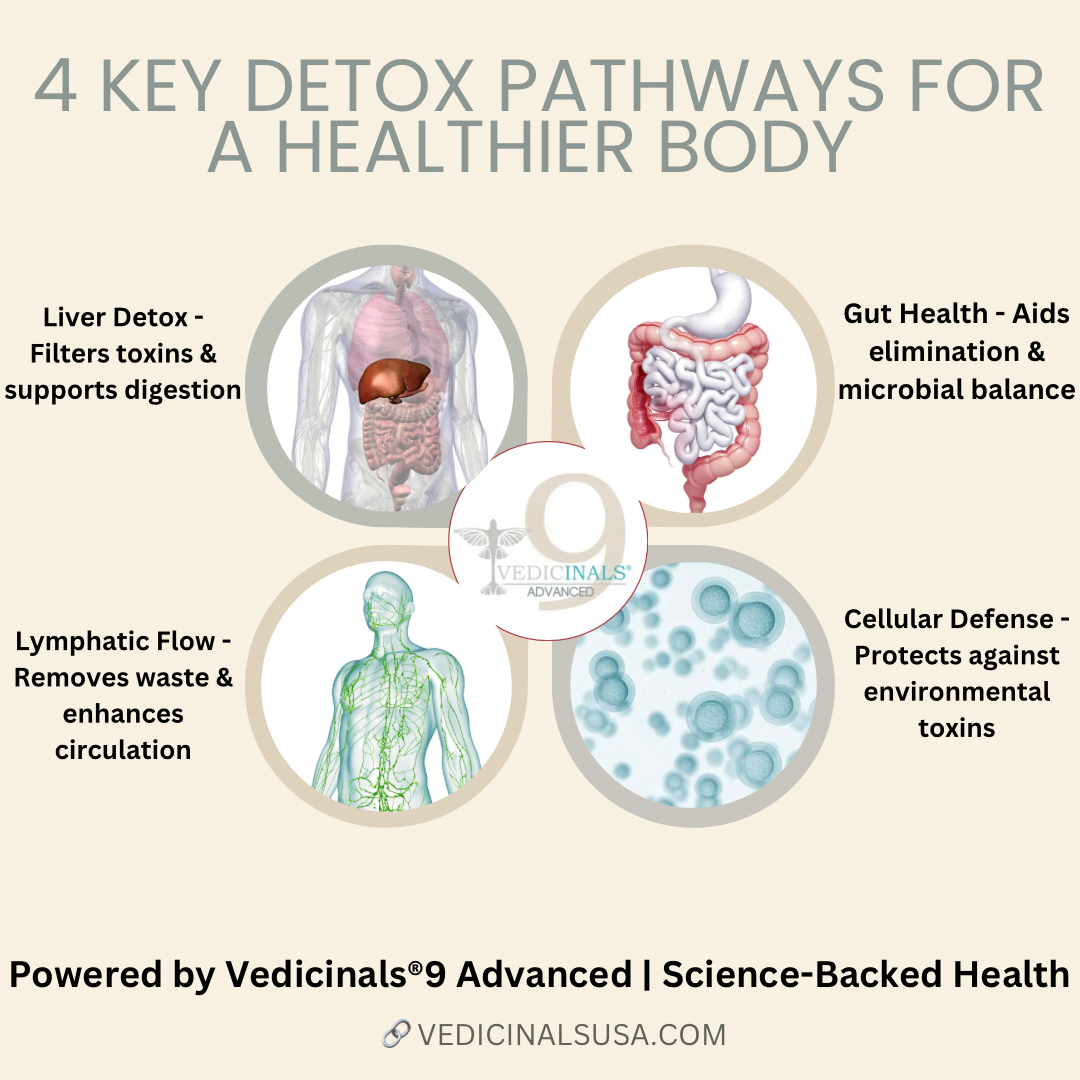Your gut is more than just a digestive organ—it’s a key player in your immune system. The gut microbiome, a diverse ecosystem of bacteria, fungi, and other microorganisms, helps regulate immune function, fight infections, and maintain overall health. When the microbiome is balanced, it supports immunity, metabolism, and neurological function. However, an imbalance can contribute to inflammation, chronic illness, and immune dysfunction.
In this post, we’ll explore why gut balance matters, how it connects to immunity, and how Vedicinals®9 Advanced supports a healthy microbiome.
The Gut-Immune Connection
1. Your Gut is Home to 70% of Your Immune System
The gut-associated lymphoid tissue (GALT) houses a significant portion of immune cells. Beneficial bacteria in the gut train the immune system, helping it differentiate between harmful pathogens and harmless substances. A balanced microbiome helps prevent overactive immune responses (autoimmunity) and underactive responses (chronic infections).
2. Microbiome Imbalance and Chronic Inflammation
When gut bacteria become unbalanced—due to poor diet, stress, antibiotics, or environmental toxins—harmful bacteria can take over. This leads to intestinal permeability (“leaky gut”), where unwanted substances enter the bloodstream and trigger chronic inflammation. Inflammation is a major driver of conditions like autoimmune diseases, metabolic disorders, and neurological decline.
3. Gut Health and Viral Resilience
A well-functioning microbiome enhances immune defense against viruses. Beneficial bacteria produce short-chain fatty acids (SCFAs), which support immune cell activity and help regulate the body’s inflammatory response. Research suggests that a disrupted microbiome can make individuals more susceptible to viral persistence and prolonged post-viral symptoms.
How to Support Gut Balance for a Stronger Immune System
1. Nourish with Prebiotics and Probiotics
• Prebiotics (fiber-rich foods like garlic, onions, and bananas) feed beneficial gut bacteria.
• Probiotics (fermented foods like yogurt, kimchi, and sauerkraut) introduce new beneficial bacteria into the gut.
• Diverse, fiber-rich diets help sustain microbiome diversity.
2. Reduce Gut Irritants
• Processed foods, refined sugars, and artificial additives disrupt gut bacteria.
• Antibiotics and NSAIDs can deplete beneficial microbes, requiring probiotic support.
• Chronic stress alters gut microbiota—mindful practices like meditation and deep breathing help restore balance.
3. Use Targeted Senolytics to Reduce Gut Inflammation
Senolytics are compounds that help clear senescent cells, reducing chronic inflammation that can damage the gut lining. Emerging research highlights that compounds like Fisetin, Quercetin, Resveratrol, and Fucoidan support gut barrier integrity and microbiome balance.
How Vedicinals®9 Advanced Supports Gut & Immune Health
Vedicinals®9 Advanced integrates natural compounds known for gut-healing, anti-inflammatory, and senolytic properties:
✅ Fisetin & Quercetin – Reduce inflammation and oxidative stress, supporting gut lining repair.
✅ Resveratrol – Promotes beneficial gut bacteria and modulates immune responses.
✅ Fucoidan – Helps remove harmful microbial overgrowth while supporting beneficial bacteria.
These ingredients work together to restore gut balance, reduce inflammation, and enhance immune resilience.
Conclusion
A balanced gut microbiome is essential for strong immunity, reduced inflammation, and overall health. By nourishing gut bacteria, reducing irritants, and using targeted senolytics, you can optimize your microbiome and immune function.
Vedicinals®9 Advanced provides a science-backed approach to supporting gut and immune health with key senolytic and anti-inflammatory compounds.
For those looking to improve gut balance and immune resilience, incorporating these strategies can be a game-changer.




Leave a comment
This site is protected by hCaptcha and the hCaptcha Privacy Policy and Terms of Service apply.